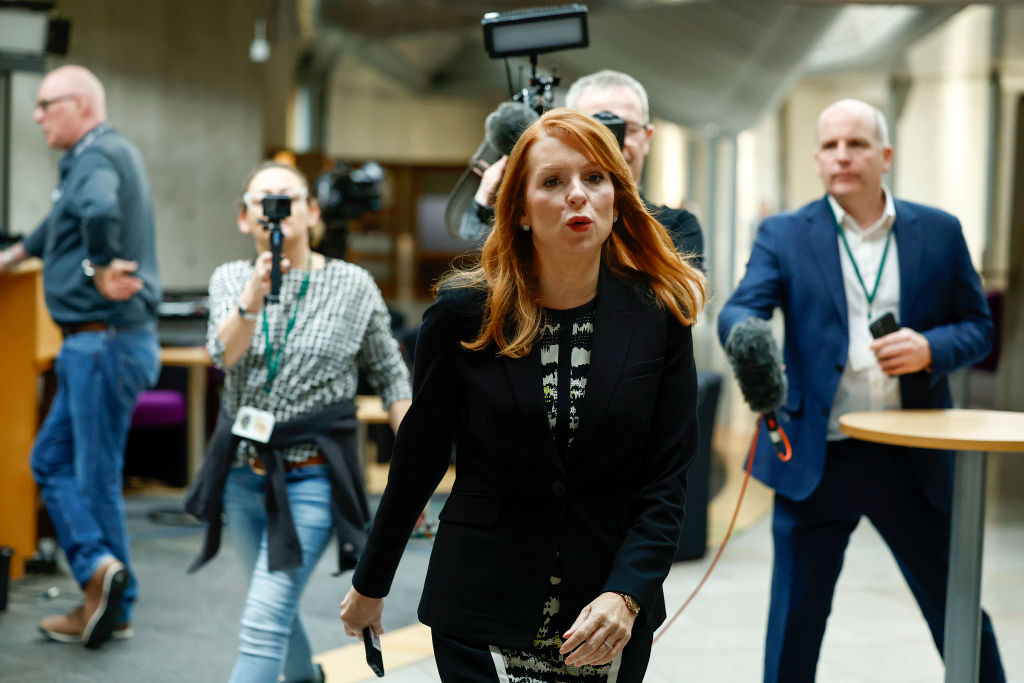Humza Yousaf is the continuity candidate. Kate Forbes is the fresh start candidate and Ash Regan is the Braveheart, director’s cut, candidate. As far as character positioning goes, it’s quite clear where each potential new first minister of Scotland stands.
Digging deeper, clear policy differences have emerged between the three. Yousaf wants to directly challenge the UK government in court over its blocking of gender reform, where as Forbes and Regan would drop the issue. Forbes and Yousaf have intimated they will adopt a gradualist approach to independence, where as Regan insists she will somehow engineer separation talks with the UK government if pro-independence parties win more than 50 per cent of the vote at the next Westminster or Holyrood election.
There is one important point of consensus emerging however: when it comes to the economic case for secession, all three candidates signal they will continue to indulge in post-truth politics in the hope of convincing a majority of Scots to break away.
Secession means the Scottish economy shrinking by at least ten per cent. This would be the kind of economic catastrophe it would take years, if not generations, to recover from.
Exhibit one is the answers they have given when questioned about the veracity of Government Expenditure and Revenue Scotland (GERS) statistics, the Scottish government’s annual assessment of overall revenues raised in Scotland versus overall public spending. SNP supporters despise the numbers because they show Scotland running persistently high fiscal deficits.
Last year’s figures showed the country running a double-digit deficit in 2021-22 of over 12 per cent of GDP. This compares with just over six per cent for the UK as a whole. Spending in Scotland was almost £2,000 per person higher than the UK average.
Independent economist Richard Marsh, who undertook research on behalf of Nicola Sturgeon’s Sustainable Growth Commission and who is a member of two Scottish Government expert groups advising on statistics and modelling, recently produced a report in which he demonstrated that a Scottish exit from the UK would lead to significant fiscal consolidation.
Marsh points out that the average net fiscal balance over the last ten years accounted for almost 11 per cent of Scotland’s economy, with the corresponding figure for the UK sitting at just over five per cent. ‘An independent Scotland would need to reduce the net fiscal balance to a share of the economy at least to the point where it was similar to the UK,’ says Marsh.
That fiscal consolidation could be achieved via hefty spending cuts or a combination of spending cuts and tax rises. If it were done via spending cuts alone then the fiscal consolidation required to keep government finances sustainable would result in a loss of £15.7 billion of output, £9.6 billion of gross value added (GVA – another measure of economic activity that nets off materials, energy etc used as production inputs), £6.4 billion of income (wages), and 164,900 full-time equivalent jobs, according to Marsh. A more balanced fiscal consolidation, using a combination of tax rises and spending cuts, would lead to a loss of £14.2 billion of output, £8.6 billion of GVA, £5.5 billion of income and 149,000 job losses.
But those are just the numbers in relation to fiscal consolidation. Taking account of other economic negatives relating to, for example, the introduction of trade friction with Scotland’s biggest export markets – the rest of the UK – leads Marsh to estimate an overall impact of over a quarter-of-a-million jobs lost, a near £30 billion hit to economic output, and a loss in GVA of over £16 billion. Secession means the Scottish economy shrinking by at least ten per cent. Talk about shock treatment. This would be the kind of economic catastrophe it would take years, if not generations, to recover from.
Back to the leadership candidates and their thoughts on the GERS numbers – which was Marsh’s starting point for assessing an independent Scotland’s position and was also the starting point of the Sustainable Growth Commission. In a Q&A with pro-independence organisation Business for Scotland, all three candidates were asked if they would commit to producing alternative GERS numbers for a hypothetical independent Scotland. SNP members at hustings events have also pressed them on this.
‘It is not only the fact that GERS cannot predict the finances of an independent Scotland, but GERS also does not give an accurate indication of the current situation,’ said Forbes.
‘The only function GERS serves is to demonstrate that the Union and UK economic policy continues to fail Scotland,’ said Yousaf, adding he agrees an alternative is needed.
Regan’s response was gobbledygook but seemed to suggest hypothetical GERS numbers under an assumption of Scotland operating its own currency would be favourable for the independence case.
It is telling that the candidates have resorted to discrediting GERS while hinting they might produce an alternative report designed to bolster the cause of independence. It seems the next first minister will indulge in the same fantasy-based campaigning that ultimately contributed to Nicola Sturgeon losing her credibility. The truth is there is no rational economic case for breaking away. The SNP lost that argument long ago.
Besides, if they want an authentic projection of an independent Scotland’s fiscal position then Richard Marsh has already done the work. Letting reality get in the way of a good story is not in the SNP playbook, however. Better to stick with delusion. It’s what the people, or at least some of them, demand.







Comments